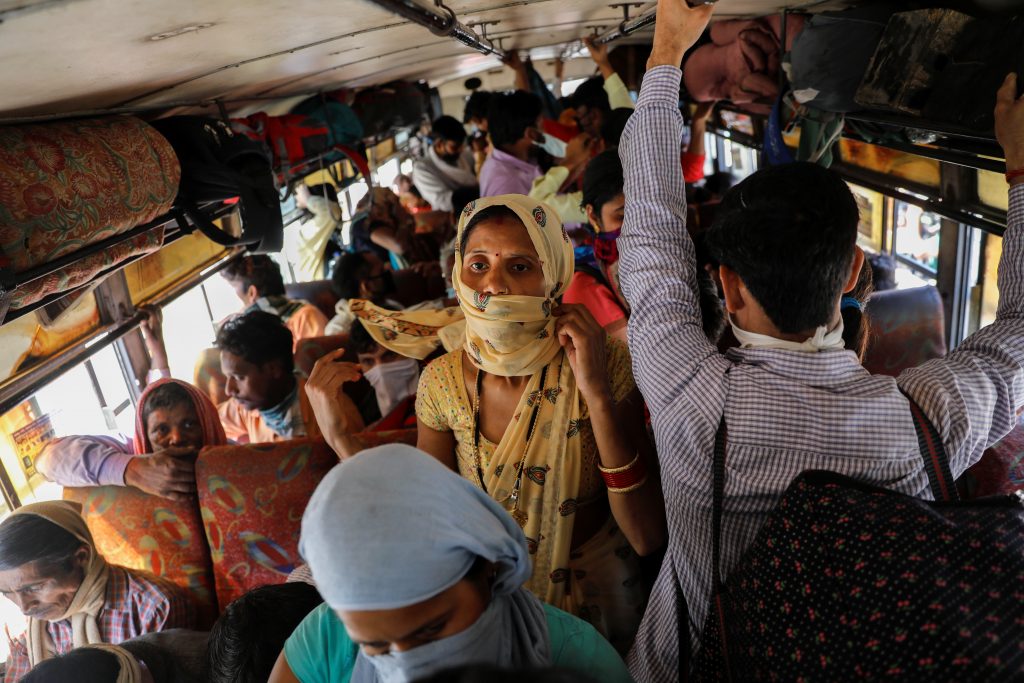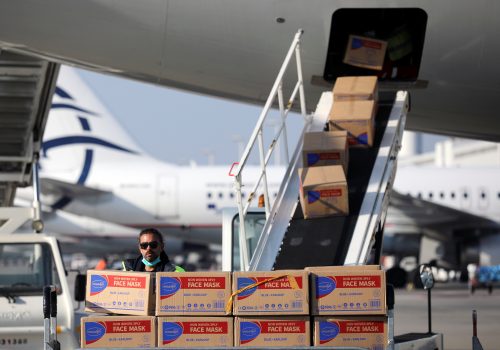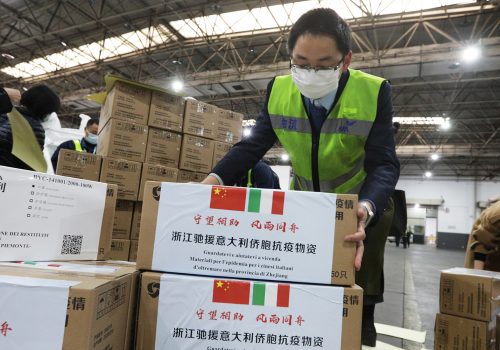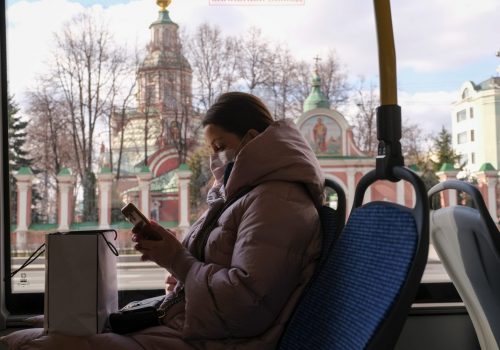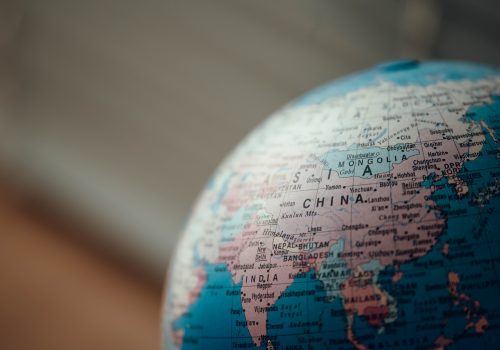With apologies to the great hockey player Wayne Gretzky, the world should follow the (paraphrased) advice given to him by his father in tackling the global pandemic of COVID-19: “Skate to where the pathogen is going, and not to where it has been.”
In short, developed countries – even as they act to save themselves – must shift far greater public health and economic attention to fragile states and emerging markets, where the hit from the virus is likely to be far more devastating, destabilizing, and enduring.
It’s for that reason that the World Bank and the International Monetary Fund this past Wednesday urged bilateral creditors to suspend debt payments and provide immediate debt relief to the world’s poorest countries – making up a quarter of the world’s population and two-thirds of those living in extreme poverty.
If world leaders don’t act in greater unity soon – and this week’s virtual meeting of G20 leaders wasn’t encouraging in that respect – the world could find COVID19’s worst impacts in swarming slums, crowded refugee camps, unresolved conflict zones, and even among some of the largest emerging market economies, like Brazil, South Africa, and India.
Get the Inflection Points newsletter
Subscribe to Frederick Kempe’s weekly Inflection Points column, which focuses on the global challenges facing the United States and how to best address them.
At the same time, Chinese authorities are taking aim at the United States by tossing its top journalists out of Beijing, by wooing American allies from Tokyo and Rome in common cause, and by contrasting its perhaps draconian approach to COVID-19 to that of President Trump.
It’s no longer a question of if this could happen but rather of when and how bad it could get. The great hope is that fragile states and emerging markets may get some relief from their young populations and hot weather. However, many of their young have a host of underlying medical conditions. And it’s not clear yet whether COVID19 will prove to be a seasonal matter.
“The global outbreak,” says Crisis Group in a far-reaching report this week, “has the potential to wreak havoc in fragile states, trigger widespread unrest and severely test international crisis management systems. Its implications are especially serious for those caught in the midst of conflict if, as seems likely, the disease disrupts humanitarian aid flows, limits peace operations and postpones or distracts conflict parties from nascent as well as ongoing efforts at diplomacy.”
Think Afghanistan, where infections coming across the border from Iran are colliding against nascent peace efforts with the Taliban. Think Libya, where the UN-backed government has pledged $350 million to respond to the disease, but without any clarity of how it could be spent effectively.
Consider Venezuela, where the conflict between the government and opposition already has hollowed out health services, and where the United States this week charged Nicolás Maduro with narco-trafficking crimes – making any relief more difficult. Or visit Gaza, where the health care system – weakened through years of blockade – couldn’t serve the high-density population even before COVID—19 began to settle in.
Crisis Group warns particularly about the dangers facing areas of active conflict, such as northwestern Syria and Yemen. Violence already impeded efforts to deal with a polio outbreak in Syria in 2013-2014 and in countering cholera in Yemen from 2016 to today.
“UN officials have now raised the alarm about COVID-19 infecting the population of Idlib (in Syria),” says Crisis Group, “where a Russian-backed offensive by government forces has systematically targeted hospitals and other medical facilities and led to the displacement of over one million people in the last six months alone.”
There’s understandable urgency aimed at reversing coronavirus’ continued spread in Europe and the United States, which this week became the world champion in the number of confirmed cases (if Chinese statistics can be believed— a Bloomberg report on funereal urns raises some doubts about that).
However, the greater danger is that of developed economies being so focused internally that they take their eyes off a potential disaster-in-the-making among fragile states and emerging markets.
Ultimately, developed countries will reduce their fatalities, douse the pathogen and rebuild their economies. After all, they can depend on established public health systems, liquid financial institutions and comparably stable political leadership.
The damage to fragile states and emerging markets is likely to be deeper, longer-lasting, and be accompanied by political instability or even outbreaks of violence. Economic disaster in these parts of the world are more likely to result in political and social disorder.
Yet instead of even the healthiest emerging markets enjoying support at this challenging moment, disinvestment has spread faster than the pandemic itself. Investors want the safer havens like U.S. government bonds, gold, or cash.
The Institute of International Finance reported that over the past two months a net $70 billion has left a group of two dozen leading emerging markets, including Brazil, China, India, and South Africa. That’s in stark contrast to inflows into those same economies of $79 billion last year.
“That shift has reignited fears that some countries could be sliding toward insolvency and default – especially Argentina, Turkey and South Africa,” wrote New York Times reporters in their own survey of how the pandemic could hit the world’s most vulnerable countries.
The spread has been fast in India this week, which with its 1.3 billion people is one of the most vulnerable countries on year. “The country already has the largest cohort of people in the world living with respiratory disease,” writes Vidya Krishnan in Foreign Affairs. “Such conditions make this densely populated country the perfect fodder for a virus that attacks the lungs of its victims.”
The Atlantic Council’s Bronwyn Bruton reports that Africa will profit from previous experience dealing with the Ebola crisis. Many nations have acted rapidly to institute temperature checks, cancel international flights and impose isolation measures.
That said, Bruton writes, “more than 70 percent of African urbanites – approximately 200 million people – reside in crowded city slums, with limited access to plumbing or electricity. In those environments, social distancing may be effectively impossible.”
South Africa, one of the continent’s richer countries and the one most-watched by international investors as a bellweather, has fewer than 1,000 intensive care unit beds for a population of 56 million.
“Extraordinary action is required if we are to prevent a human catastrophe of enormous proportions to our country,” said South African President Cyril Ramaphosa on Monday. He announced a 21-day nationwide lockdown to be enforced by the military.
On reflection, the overused Gretzky aphorism atop this column minimizes the danger of ignoring that advice regarding COVID-19. The cost of failing to act more decisively and proactively could be measured in hundreds of thousands of lives and in national futures.
This article originally appeared on CNBC.com
Frederick Kempe is president and chief executive officer of the Atlantic Council. You can follow him on Twitter @FredKempe.
MUST-READS FROM A WORLD IN TRANSITION

From the first days of coronavirus in China, Inflection Points has tried consistently to track how the virus could change and was changing the world.
I’ve been stepping up my advice to U.S. and Western leaders to ensure that their alliances, institutions, values, and democracies rise to this moment. Last week’s column argued that should the U.S. fail to lead at this moment – both by example and through building a global “Coalition to Contain COVID-19” – it could speed the end of the American era.
This week’s top-reads are in similar vein.
They begin with pieces by Fareed Zakaria in the Washington Post and Nicholas Burns in Foreign Affairs on what’s behind the failure of U.S. global leadership.
They include Graham Allison’s look in The National Interest about how the U.S. must simultaneously be a rival and partner for China at this time. John Pomfret’s piece in Foreign Affairs makes one wonder how to do so with a country that is throwing out Western journalists who have been so useful to it over the past 150 years.
Larry Diamond in The American Interest raises the question we should all be asking of how our democracies – and particularly our November 3rd elections – will survive this pathogen.
The FT’s Guy Chazan tracks the amazing “comeback” of Angela Merkel, and Spiegel reports horrifying new scenes from the Spanish front.
I close with a nod to the Atlantic Council’s own Matthew Kroenig and his timely new book out this week, the Return of Great Power Rivalry. He captures its pandemic themes in The National Interest. (We’ll launch the book at a virtual event Tuesday. Register here.)
#1. A TEST IN LEADERSHIP
It’s easy to blame Trump for this fiasco. But there’s a much larger story.
Fareed Zakaria / THE WASHINGTON POST
How to Lead in a Time of Pandemic
Nicholas Burns / FOREIGN AFFAIRS
“There’s a much larger story (than just Trump) behind this fiasco,” writes CNN’s Fareed Zakaria in The Washington Post. “The United States is paying the price today for decades of defunding government, politicizing independent agencies, fetishizing local control and demeaning and disparaging government workers and bureaucrats.” Read More →
Nicholas Burns, an Atlantic Council board member, weighs in with a reminder that the United States through its history “has been fortunate to have visionary, charismatic leadership at times of great crisis:” George Washington, Abraham Lincoln, Franklin Roosevelt.
He regrets that Trump “has not proved himself to be anywhere close to such a leader,” though he adds it is not too late.
His remedy: “The administration should join with other global leaders to launch at least three high-level international efforts….one made up of top leaders, one made up of economic policy makers, and one made up of US and Chinese officials.” Read More →
#2. MANAGING RELATIONS WITH CHINA
In War Against Coronavirus: Is China Foe—or Friend?
Graham Allison / NATIONAL INTEREST
China Will Miss American Reporters When They Are Gone
John Pomfret / FOREIGN AFFAIRS
Graham Allison, one of our country’s leading strategists and experts on U.S.-Chinese relations, provides a rich read on how COVID-19 dramatically tests the ability of whether “statesmen can be wise enough to find ways for rivals to simultaneously be partners.”
“Adults should move on,” he writes, noting elsewhere, “…the fact is that we cannot succeed in this war against coronavirus without making China part of the solution.” Read More →
That’s not a simple thing to do with a country that has just expelled more than a dozen American journalists from the Wall Street Journal, the Washington Post and the New York Times. Read those newspapers’ powerful statement here.
John Pomfret reflects on how removing Western media will hurt Chinese the most as Western media reports have been a force for reform and modernization for the past 150 years. Without this press scrutiny, Chinese themselves would have been less aware of everything from environmental depravation to the mass incarceration of Uighurs in northwestern China – based on a leak from “a member of the Chinese political establishment.” Read More →
#3. THE VIRUS VS. DEMOCRACY
How We Can Manage the Pandemic and Preserve our Democracy
Larry Diamond / THE AMERICAN INTEREST
“The COVID-19 pandemic presents the United States not only with its worst public health crisis in a century but also the most formidable challenge to its democracy since World War II,” writes Larry Diamond, one of the world’s leading scholars in democracy studies.
Scan to the part of his American Interest article that prescribes urgent action to ensure that our Congress continues to function, and November 3rd elections can be held, irrespective of the state of coronavirus at that time.
“For the legitimacy and integrity of our democracy,” he writes, “it must not be postponed.” Read More →
#4. THE RETURN OF MERKEL
Germany’s crisis manager is back
Guy Chazan / FINANCIAL TIMES
“I Cry Every Day When I Get Home”: Madrid Hospitals Struggle to Handle Surge of Corona Patients
Steffen Lüdke / DER SPIEGEL
The FT’s Guy Chazan provides a rich account of Angela Merkel’s “comeback,” driven by something she hadn’t ever done before: a television address to the nation, delivered with a calm and insistent demeanor.
“Few had seen her show such empathy and motion,” Chazan writes. “The impact was correspondingly huge: some 30m people watched the 12-minute speech. They knew they were in the safe hands of Europe’s most experienced crisis manager.” Read More →
Europe will need every bit of that. The horrifying Spiegel story above on the rapid COVID-19 spread, alongside ongoing reporting on Italy, underscores further the unique challenge facing the European Union. Read More →
#5. GREAT POWER RIVALRY
Pandemics Can Fast Forward the Rise and Fall of Great Powers
Matthew Kroenig / THE NATIONAL INTEREST
“As COVID-19 continues to spread in the United States, analysts are rightly focused on the possible medical and economic ramifications,” writes Matt Kroenig in The National Interest. “But this pandemic is already shaping the most important geopolitical development of the twenty-first century: America’s great power rivalry with China.”
For those who wish to go deeper, buy the book The Return of Great Power Rivalry, which comes out this week. As I write in my blurb on the book cover, this “rising star among the next generation of strategic thinkers brilliantly counters the current political narrative of autocratic ascendancy and democratic decline.” Read More →
One can only hope he’s right.
QUOTE OF THE WEEK
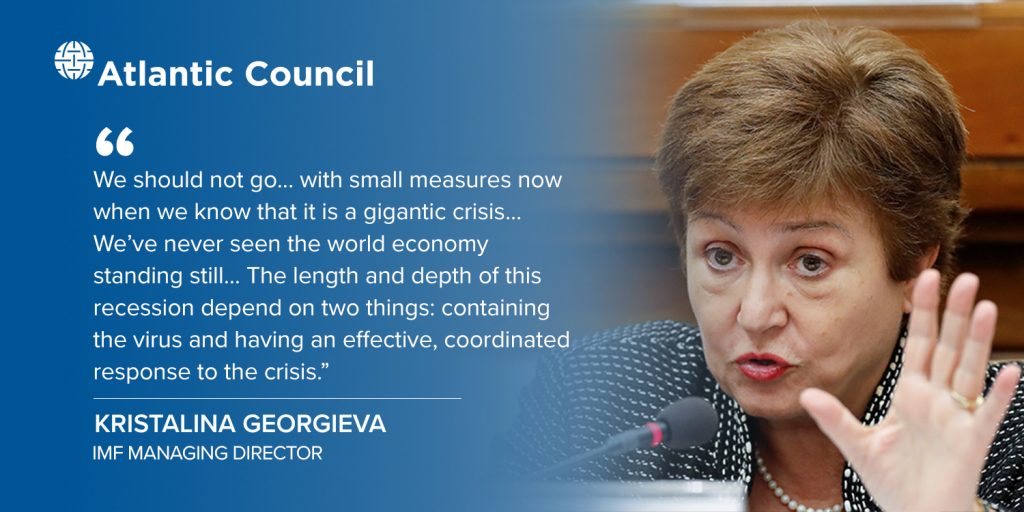
ATLANTIC COUNCIL TOP READS
Image: Migrant workers are seen in a bus arranged by Uttar Pradesh state government to transport the people stranded during a 21-day nationwide lockdown to limit the spread of coronavirus disease (COVID-19), in Ghaziabad, on the outskirts of New Delhi, India March 28, 2020. REUTERS/Anushree Fadnavis
